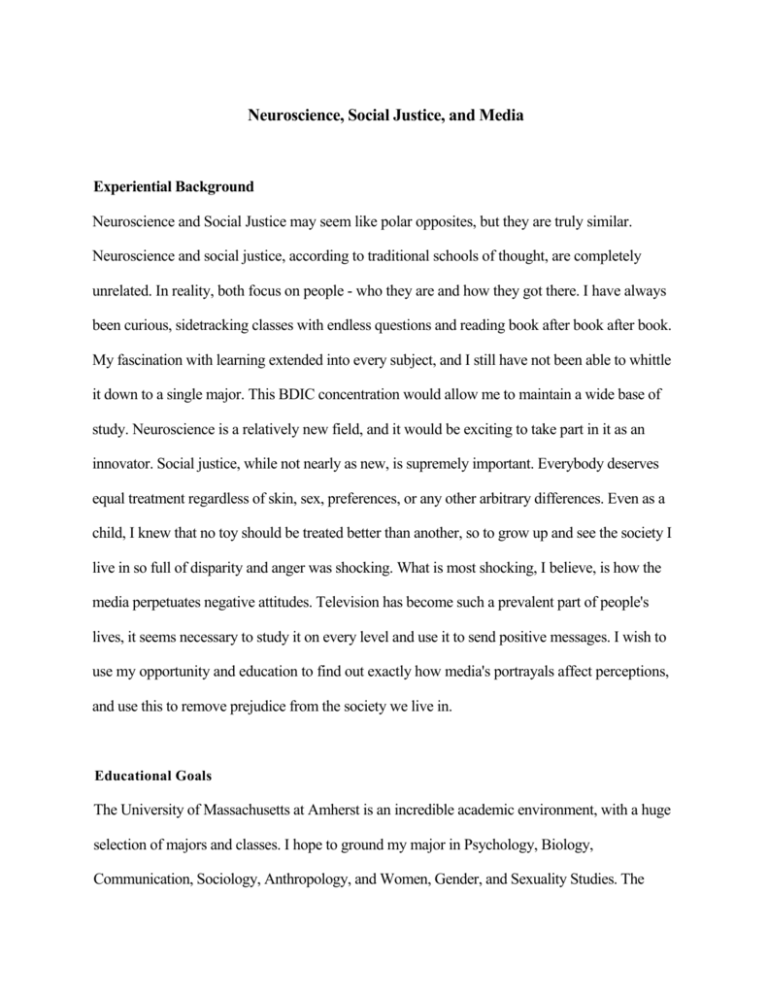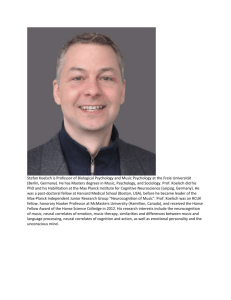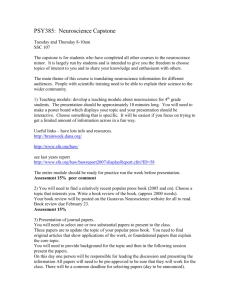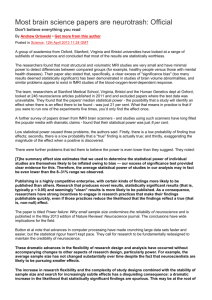Neuroscience, Social Justice and Media
advertisement

Neuroscience, Social Justice, and Media Experiential Background Neuroscience and Social Justice may seem like polar opposites, but they are truly similar. Neuroscience and social justice, according to traditional schools of thought, are completely unrelated. In reality, both focus on people - who they are and how they got there. I have always been curious, sidetracking classes with endless questions and reading book after book after book. My fascination with learning extended into every subject, and I still have not been able to whittle it down to a single major. This BDIC concentration would allow me to maintain a wide base of study. Neuroscience is a relatively new field, and it would be exciting to take part in it as an innovator. Social justice, while not nearly as new, is supremely important. Everybody deserves equal treatment regardless of skin, sex, preferences, or any other arbitrary differences. Even as a child, I knew that no toy should be treated better than another, so to grow up and see the society I live in so full of disparity and anger was shocking. What is most shocking, I believe, is how the media perpetuates negative attitudes. Television has become such a prevalent part of people's lives, it seems necessary to study it on every level and use it to send positive messages. I wish to use my opportunity and education to find out exactly how media's portrayals affect perceptions, and use this to remove prejudice from the society we live in. Educational Goals The University of Massachusetts at Amherst is an incredible academic environment, with a huge selection of majors and classes. I hope to ground my major in Psychology, Biology, Communication, Sociology, Anthropology, and Women, Gender, and Sexuality Studies. The psychology major at UMass does have a neuroscience track, but it is geared towards behavioral neuroscience and does not encompass all of my interests. I will therefore add to it, expanding on this curriculum. The other four colleges have classes that would fit very well, and doing a BDIC will give me more room to take those classes that suit my academic needs better. The neuroscience track also does not go into the scientific depth of the brain as much as I would like. I hope to add more biology and biochemistry to my schedule to understand the inner workings of the brain, the molecular structures, and the cellular functioning. Communication classes will allow me to explore media - how it is made and what those who make it have in mind. I will take courses in communication that focus on the interplay of media and its audience. Taking classes from Sociology, Anthropology, and Women, Gender, and Sexuality Studies will broaden my sphere of knowledge and information. Put together, my curriculum will give me varied perspectives on similar topics -1 will be able to view any questions I have through these lenses and develop a sharper image. These classes, taught with the caliber that UMass is known for, as well as the other colleges in the consortium, will no doubt give me the background I need to go on to graduate school and to impact the world. Continuing Aims After earning my undergraduate degree from UMass, I intend to go to graduate school. For my doctorate, I want to study neuroscience. Particularly, I would like to research how our own thoughts, the media, and interactions with others affect the brain and its connections, expanding on the foundation set up by my BDIC studies. After graduate school, I would ideally end up back in school as a professor. I would then be able to continue on with my research in the field of social and media neuroscience, while passing along what I know to eager students. Exceptions The Plastic Brain - Hampshire College - CS 269 I want to study how the media we watch can affect our interactions with people, focusing on what happens in the brain. Jane Couperus' course, "The Plastic Brain", delves into the topic of brain plasticity and how external factors can change the layout of our brain. As my concentration is about gaining many perspectives on this phenomenon, this class will be good for both the scientific aspect of what happens in the brain and the social aspect of what influences those changes. I would also like to point out that Hampshire College uses a different numbering system. Sponsor Choice Daniel Anderson seems to be the clear sponsor choice for me. He is a retired professor who taught classes, carried out his own research, and was able to use what he learned to really change the way something worked. Dan Anderson studies how children watch media and the cognitive effects of television on young kids. He dispelled myths about how kids react to television, such as the myth that they are more attracted to action-packed scenes and fast-paced plots. His success in research prompted big networks to contact him for aid in designing new shows. Because of Dan Anderson, children throughout the world use television as more than just entertainment. We learned from programs that were not afraid to break the fourth wall and include us, and found it easier to pay attention when we understood. Dan Anderson focuses on children and uses techniques grounded in psychology with little attention to the brain, and these are the only two differences in our main interests. I am astounded at how much media can impact our actions and behaviors, and I want to find out much, much more about why and how that is. Anderson is finishing up research projects now in his retirement, and has suggested that I help his team with these. His experience with UMass makes him a great candidate for an advisor, as he can help me choose classes from departments that highlight media and society, as well as psychology. I have many mentors in neuroscience, and they can fill in the small blanks that Anderson's knowledge will have.





